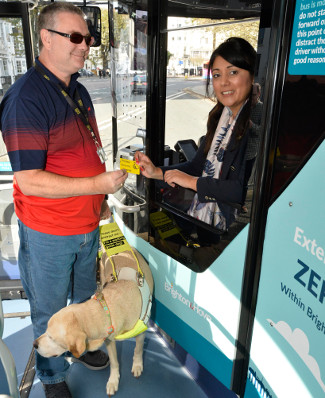Ministers have pledged more accessible buses around Great Britain under a new £2m partnership to help small operators provide audible and visible on-board information.
The Real Time Information Group (RTIG), which supports good practice in the use of communications technology on public transport, will work with the Department for Transport (DfT) to allocate the cash.

Ms Ghani and Mr Oulton
The funding aims to help passengers board buses with greater confidence, knowing where they are and when to get off.
The DfT said local bus operators ‘are likely to be required to have audio and visible information systems in their vehicles’, and this funding is intended to help small operators, which might find this costly to implement.
Officials said that with audio visual equipment only available in limited areas, and predominantly provided by larger operators, the DfT expects this funding to benefit up to 30 small bus operators.
Accessibility minister Nusrat Ghani said: ‘Transport is at the heart of how we live our lives, and I am determined that we remove any barriers faced by disabled people.
‘Every passenger, regardless of where they travel in Great Britain, should be able to do so confident that they have boarded the correct vehicle and are travelling to the right place.’
The cash was announced as part of the government’s Inclusive Transport Strategy which aims to provide equal access to the transport network by 2030.
Ms Ghani visited Brighton and Hove Buses and boarded one of the firm’s 30 new extended-range electric buses, which travel in zero-emissions mode through the city centre.
She is pictured with local resident Graham Oulton, who is registered blind and helped the firm, which is owned by the Go-Ahead Group, add audio information to its fleet.
Mr Oulton said: ‘It’s tremendous getting on board a bus and hearing your stops. It’s amazing for me because it’s freedom. I can go anywhere.’
Brighton and Hove managing director Martin Harris said: ‘Our entire fleet of 440 buses is made up of “talking buses”, where passengers can see and hear next stop and other announcements, such as diversions.
‘We introduced them in 2016 after one of our visually impaired passengers told us she had alighted at the wrong stop several times and it was making her anxious.’
The announcement coincided with the launch of the 'It’s everyone’s journey' campaign, the first stage of a government-backed initiative 'to highlight the part we can all play in improving disabled people’s experiences when using public transport’.
The DfT said it is calling on charities, transport operators, and commercial organisations to join the campaign, helping to raise awareness of the needs of disabled travellers and share some of the improvements being made to make travel easier for them.
Register now for full access
Register just once to get unrestricted, real-time coverage of the issues and challenges facing UK transport and highways engineers.
Full website content includes the latest news, exclusive commentary from leading industry figures and detailed topical analysis of the highways, transportation, environment and place-shaping sectors.
Use the link below to register your details for full, free access.
Already a registered? Login